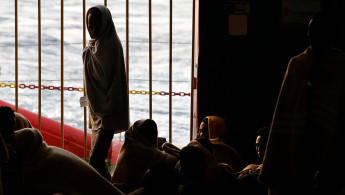Scores arrested in Bangladesh over Libya migrant massacre
Detectives arrested nine suspected people smugglers in Dhaka on Sunday, on charges of violating anti-trafficking and anti-terrorism laws, bdnews24 said.
Two phones, four passports and two notepads listing details of financial transactions linked to the incident were seized during the operation, Commissioner of Dhaka Metropolitan Police Abdul Baten said.
Earlier the same day, 13 people across the country with links to over the killings of the Bangladeshi workers in Libya, according to the country's Police Headquarters.
In last month's attack in Libya, the family of a slain Libyan human trafficker attacked a group of migrants in a town that recently had changed hands amid the fighting over the country's capital, killing 26 Bangladeshis and four African migrants.
The Libyan government has said 11 other Bangladeshis were wounded in the attack on 28 May. The UN migration agency said the migrants were shot and killed in a smuggling warehouse in the desert town of Mizdah, where a group of migrants were being held.
Twitter Post
|
Baten said the crackdown on the rogue recruiters of migrant workers and human smugglers continued after two separate cases were filed by the victims’ families following the killings.
He said it appeared that the victims of the attack had been trafficked to Libya via India, the UAE and Egypt.
He also said the victims were detained in various camps in the North African nation and subjected to physical and mental torture.
The traffickers made video and audio recordings of the victims and sent them to their families in Bangladesh to extract money, Baten said.
Bangladesh’s inspector general of police, Benazir Ahmed, had earlier said that "the way our people were brutally killed is unacceptable".
"No one will be spared who has deceived our citizens … took them overseas and are responsible for these miserable deaths," he said.
Migrants fleeing poverty and conflict in Africa, Asia and the Middle East typically pass through Libya on their way to Europe, departing Tripoli’s rocky coast in inflatable dinghies.
The Libyan coast guard, trained by the European Union to keep migrants from reaching European shores, intercepts boats at sea and returns them to Libya, where many migrants land in detention centers rife with torture and abuse.
Sending workers abroad is crucial for Bangladesh’s economy. Some 10 million Bangladeshis working overseas send home about $20 billion per year.
Saudi Arabia has long been the largest source of remittances, followed by the UAE, Qatar, Oman, Bahrain, Kuwait, Libya, Iraq, Singapore, Malaysia, the United States and Britain.
Follow us on Facebook, Twitter and Instagram to stay connected





 Follow the Middle East's top stories in English at The New Arab on Google News
Follow the Middle East's top stories in English at The New Arab on Google News
![Israeli forces ordered bombed Gaza's Jabalia, ordering residents to leave [Getty]](/sites/default/files/styles/image_330x185/public/2176418030.jpeg?h=a5f2f23a&itok=_YGZaP1z)

